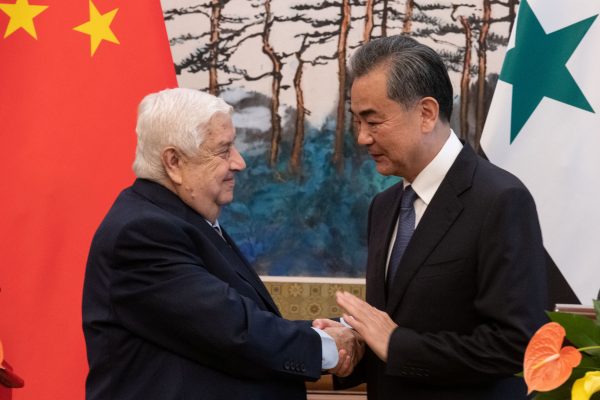Such devastation has been a regular feature of this conflict. Yet China, with Russia in the lead, has on eight occasions used its UN Security Council veto at key moments of the war. Indeed, Russia has used its veto on several additional occasions as it seeks to ensure that Syrian President Bashar al-Assad remains in power. But use of the veto is unusual behaviour for Beijing. Prior to the outbreak of fighting in Syria in 2011, Beijing had only used its veto six times since it took its UN seat in 1971. Surprisingly, Beijing has persisted despite attracting very little support from the other 13 members of the Security Council.
The latest veto came in December 2019 when both Beijing and Moscow voted against a resolution designed to allow humanitarian agencies continued access to besieged populations through four previously-agreed border crossings. In Beijing’s view, the agencies needed to coordinate with the Syrian government rather than deliver assistance directly to the populations in need. The resolution, drawn up by non-permanent members of the Security Council, Belgium, Germany and Kuwait, sought to re-authorise the cross-border transfer of humanitarian goods such as medicines and surgical supplies for one year. But just two crossing points were mandated for six months (from January 2020) after extended bargaining by Russia.
Beijing’s recent voting patterns have carried social costs for the Chinese government, particularly in the war’s early stages. In February 2012, Beijing and Moscow both vetoed a Security Council resolution that was expected to pass unanimously after significant revisions had taken into account Chinese and Russian objections. That resolution demanded that all parties in Syria stop all violence and reprisals, while Beijing’s ambassador argued that its passage would undermine prospects for political dialogue with Syrian authorities. China’s veto attracted domestic criticism. It also attracted criticism from then UN secretary-general Ban Ki-moon and various Middle Eastern states, 10 of whom had co-sponsored the resolution.
Why has Beijing decided on this course of action? Keeping Bashar al-Assad in power and ensuring the territorial integrity of Syria remain key Chinese objectives. Following the 2011 UN intervention in Libya — which saw the overthrow and eventual killing of its leader Muammar Gaddafi — China perceived the threat of external intervention designed to force regime change in relation to any government attempting to deal with domestic unrest as having gained in strength.
In the Middle East, such forms of external intervention are also seen as generating conditions enabling the rise of Islamist extremism. China’s fear of ethnic Uyghurs joining jihadist organisations in Syria has grown over the course of the war, with Beijing now justifying its draconian and counter-productive policies in Xinjiang as a response to that fear. A Global Times editorial claims that it was only through the strong leadership of the Chinese Communist Party that Xinjiang managed to ‘avoid the fate of becoming “China’s Syria”, or “China’s Libya”’.
China and Russia have also decided to strike a bargain, and more frequently than in the past, to operate as a ‘P2’ within the UN Security Council by supporting each other on issues of core concern. This is happening at a time when a usually dominant ‘P3’ of Britain, France and the United States find their own relations fraying over a range of matters, including developments connected with Mali, Israel–Palestine and Iran.
Beijing now believes that it can more easily deflect criticism of its more outspoken stance. Such boldness is a result of China’s increased global economic and political influence. But to mitigate criticism of its vetoes from Middle Eastern states, Beijing stepped up its regional engagement by launching its first ‘Arab Policy Paper’ in 2016 and Chinese President Xi Jinping visited several countries in the region.
China has since worked to cement economic ties through the Belt and Road Initiative, infrastructure investment and trade. Through diplomacy, Beijing reminds a generally sympathetic audience of the devastating consequences of western-led military interventions in Iraq and Libya, and how that involvement facilitated the rise of militant groups and insurgent forces in the region.
Middle Eastern states no longer openly admonish China in the way they attempted in 2012. Even beyond questions relating to China’s Syrian vetoes, none of the majority Muslim states in the Arab world have publicly criticised China’s widespread and arbitrary detention of Uyghur and other Muslim communities in Xinjiang province.
Continued disunity at the UN Security Council and more joint Chinese and Russian vetoes in support of the Syrian government are expected. Meanwhile, Syria’s civilian population continues to suffer from the carnage inflicted in the final stages of this brutal war.
Rosemary Foot is Professor Emeritus and Senior Research Fellow in International Relations at the University of Oxford. She is author of ‘China, the UN, and Human Protection: Beliefs, Power, Image’, which will be published by Oxford University Press in May 2020.

